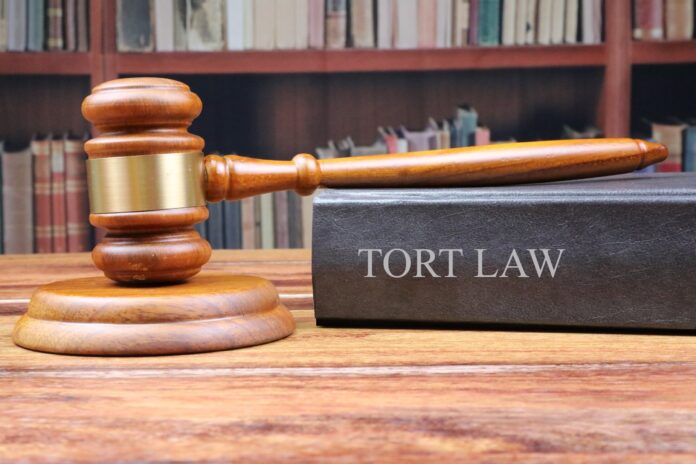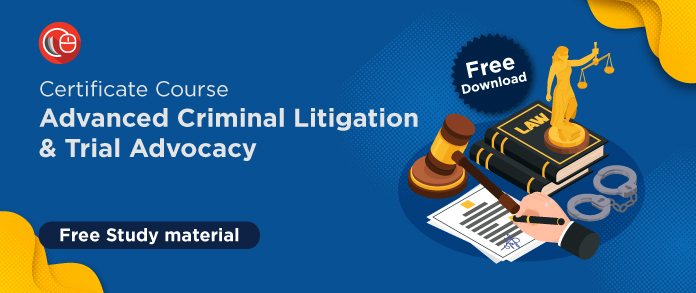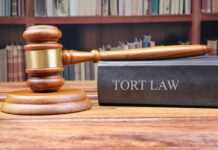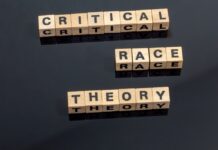This article is written by Gautam Badlani, a student at Chanakya National Law University, Patna. This article examines the various types of tort laws and how these torts protect the interests of business owners. It also highlights certain landmark judgments relating to economic torts and explains the essentials of various business torts.
It has been published by Rachit Garg.
Introduction
Business interests are vulnerable to the acts of third parties. The economic interests of the businesses are disrupted by the comments made by third parties or by the interference of other persons in its business or contractual relations. In some cases, the disruptions are intentionally caused with the object of hurting the business interests.
However, the victim business can claim remedies provided under tort law. Torts may be defined as acts or omissions which qualify as civil wrongs and cause harm or injury to another person. A tort is a wrong which causes harm or injury to another person for which the remedy is in the form of damages or compensation. A tort arises when a person breaches the duty that he owes to another person. Civil wrongs result in damages such as personal injury, death, property damages or any other consequential loss. The courts can impose liability for such harm or injury. Liability can be imposed for any injury, that is, breach of legal right, as well as for any damage, that is, loss or damage suffered by the plaintiff.
Tort laws provide various protections to business interests and ensure that the victim is adequately compensated for his loss. These torts often do not find any remedies in statutes and are based on gradual jurisprudential development. Such torts evolve through legal decisions and practices.
Economic Torts
Business or economic torts refer to such wrongful acts which are committed to causing harm to a business. These torts result in loss of profit, reputation or competitive advantage of the victim business. Some examples of economic torts are providing false information or interfering with the business’s future profit prospects.
Tortious interference
When a person wrongfully interferes with the business or contractual relations of a business, it is known as tortious interference. The elements of tortious interference are as follows:
- An intentional act of interference with the victim’s business
- the act must be a proximate cause of the loss to the victim’s business
- Actual loss on damage must be caused to the victim’s business
The tortious interference may affect an existing business interest of the plaintiff or it may affect a probable futuristic economic interest of the plaintiff. For example, the defendant may induce a third party not to enter into a contractual relationship with the plaintiff or the defendant may induce the third party to breach an existing contract that the third party has with the plaintiff. Tortious interference can be classified into three parts.
Disparagement
Disparagement is similar to defamation. Under this tort, a person makes untrue statements about any business or the product or service of the business and such false statements affect the economic profits of the business.
Contractual Relations
Tortious interference with contractual relations occurs when the defendant intentionally and wrongfully induces a third party to breach its contract with the plaintiff. The essentials for this tort are:
- The existence of a valid contract between the plaintiff and the third party.
- The defendant must have knowledge of such a valid contract and must intentionally and wrongfully induce the third party to breach the contract.
- Such a breach of contractual relations must cause economic damage to the plaintiff.
- Such breach of contract would not have occurred in ordinary circumstances had the defendant not interfered in the contractual relations.
It is necessary that the defendant must have interfered in the contractual relations with the intention of causing the breach of contract. Moreover, it is pertinent to note that if the defendant wrongfully induces the third party to breach the contract but the third party nonetheless honors the contractual relationship with the plaintiff, then in such a scenario, the defendant cannot be held liable for the tortious interference in contractual relations.
Lumley v Gye (1853)
In the landmark case of Lumley v Gye (1853) Miss Wagner was an opera singer who had entered into a 3-month contract with Lumley to sing at Her Majesty’s Theatre. Gye persuaded Miss Wagner to dishonor her contract with Lumley and promised that he would pay her more than Lumley. Thus, Wagner agreed to sing only at the theatre of Gye and disregarded her contract with Lumley.
The issue that arose before the court was whether Lumley was entitled to claim damages from a third party for interfering with the contract that he had with Miss Wagner.
The court held that Wagner and Gye were joint wrongdoers in the case and Lumley was entitled to claim damages from them. The Court held that any person who intentionally and/or maliciously persuades another person to disregard his contract of service can be held liable for tortious interference. Such an act of persuasion would prove that the third party intended to cause a loss to the plaintiff by his actions. However, if the third party was unaware of the existence of a contract or did not have the intention to cause economic loss to the plaintiff, then in such a scenario, the third party cannot be held liable to pay damages.
The court concluded that in the present case, Lumley had a cause of action and Gye was liable to pay damages for the economic loss caused to Lumley by his actions.
ASDI, Inc. v. Beard Research (2010)
In the case of ASDI, Inc. v. Beard Research (2010), the Court of Chancery found the appellants guilty of tortiously interfering with the future business relations of the appellees with certain third parties. However, the Court of Chancery did not find the appellants guilty of tortious interference with the contractual relations of the appellees and the third party, that is, Pfizer. The Court held that since the termination of the contract by Pfizer was lawful, the appellants could not be held liable for tortious interference with contractual relations.
An appeal was preferred before the Supreme Court of Delaware by the appellants. The Supreme Court affirmed the judgment of the Court of Chancery. Additionally, the Court found the appellants guilty of tortious interference with contractual relations between the appellees and Pfizer. The Court held that the lawful nature of the termination of the contract would not bar a claim of tortious interference. The wrongful inducement by the defendant would be the focus of a claim of tortious interference with contractual relations. If the defendant wrongfully induced the third party to terminate the contract, then the defendant would be liable for tortious interference even if the termination of the contract was lawful. The lawful nature of the termination will not diminish the cause of action. Even if the third party has the lawful right to terminate the contract at will, the wrongful inducement by the defendant would qualify as tortious interference. In the present case, Pfizer terminated the contract only after the appellants had tortiously induced him to do so. Hence, the appellants were found guilty of tortious interference with the contractual relations that existed between the appellees and Pfizer.
Prospective advantage
Tortious interference with prospective advantage occurs where there is no valid contract between the plaintiff and the third party and the defendant interferes with the relationship between them. Under this tort, the defendant wrongfully interferes in the relationship between the plaintiff’s business and a third party with the intention of damaging the relationship and causing economic loss to the business. Such interference may disrupt the potential contract that the plaintiff and the third party may have entered into in the future.
This tort is also known as tortious interference with business relations. The essentials of this tort are:
- There must be some business relations between the plaintiff and the third party.
- The defendant must have knowledge of such relation and must intentionally and wrongfully interfere with the relationship.
- Such an unjustified interference must cause economic damage to the plaintiff.
The burden of proof on the plaintiff under this tort is generally more than the burden in case of tortious interference in contractual relations. This is because a potential interest in an anticipated contract is difficult to determine as compared to a well-defined interest established by virtue of a legally binding contract.
Unfair competition
Under this tort, the defendant causes economic loss to the plaintiff’s business by engaging in a deceptive or wrongful business practice. Examples of unfair competition are misrepresentation and false advertisement.
The tort law relating to unfair competition helps maintain free and fair competition in the market. The tort law concerning unfair competition serves two purposes. Firstly, it protects the interest of the competitors and secondly, it protects the interest that the society has in fair competition. This tort seems to be inspired by the economic theory of laissez faire. This theory promotes and encourages a free economy with fair competition.
The tort law is aimed at incentivizing creators and innovators. It provides protection to business owners who invest their efforts and money in developing and improving a product or service. This tort ensures that such business owners are not exploited by the unfair use of their products by others persons.
It is pertinent to note that in many cases, the lawyers prefer to invoke business torts instead of antitrust claims. This is because the burden of proof on the plaintiff in the case of business torts is less as compared to the burden in the case of antitrust claims. Unlike antitrust laws, the plaintiff is not required to establish any competitive injury in case of thought of unfair competition. Economic torts actions are generally less expensive as compared to antitrust claims because there is no expert testimony required in the case of business torts.
Injurious falsehood
Under the tort of injurious falsehood, the defendant publishes false information relating to the plaintiff or his product and such false publication causes economic damage or loss to the plaintiff. The tort of injurious falsehood has the following essentials:
- The defendant must make a statement about the plaintiff’s business, product or services to a third party. It is pertinent to note that a statement made by the defendant to the plaintiff himself would not fulfill the essentials of injurious falsehood.
- Such statements made by the defendant must be published. Publication may be in oral or written form.
- The publication must identify with the plaintiff, either expressly or impliedly.
- The publication made by the defendant was false. The burden of proving that the publication was false is on the plaintiff. The defendant, on the other hand, may take the defense of the truth of the publication.
- The defendant made the publication with the intention of causing loss to the plaintiff. The defendant must have a malicious intention behind making the publication. Such malice can be proved by establishing that the defendant knew that the publication of such statements would cause economic loss to the plaintiff.
- The plaintiff suffered actual economic loss due to such publication.
The defendant cannot make false comparisons between his product and the products of the plaintiff. Such actions fall within the scope of the tort of injurious falsehood.
The relief that may be awarded to the plaintiff depends on the type of injury. The plaintiff can claim damages if any actual economic loss has occurred to him. On the other hand, the courts may grant an injunction where the publication has not caused any actual loss but is likely to cause a loss in the future.
Passing off and deceit
Under the tort of passing off, the defendant deceitfully attempts to imitate the goods of the plaintiff and tries to convince the public to purchase his goods based on the goodwill and reputation of the plaintiff’s goods. As per the trinity test laid down by the House of Lords in the case of Reckitt and Coleman Products v. Borden (1990), the following essentials must be satisfied to establish the tort of passing off:
- The goods of the plaintiff enjoy certain goodwill or reputation
- The defendant has deceitfully attempted to imitate the goods of the plaintiff such that the general public would likely believe that the goods of the defendant emanate from the plaintiff.
- The plaintiff is likely to suffer some economic loss due to the deceitful representation made by the defendant.
The tort of passing off originated from the common law and also exists in other common law countries such as the United Kingdom and Australia. However, this tort is also referred to as ‘misappropriation’ in the United States. While both ‘passing off’ and ‘misappropriation’ are similar in nature, the essentials of misappropriation vary from those of tort of passing off. In the case of National Basketball Association v Motorola (1997), the essentials of misappropriation were summarised as follows:
- Some information must be generated by the plaintiff at some expense.
- The information has some value and such value must be time-sensitive
- The defendant must use such information in a manner that it directly competes with the plaintiff’s business
- The free use of the information collected by the plaintiff would disincentivize the production of the product to which the information relates.
Liability for defective products
Under this tort, the defendant can be held liable for the damage caused to the plaintiff by his product. Any party across the chain of manufacturing can be held liable under this tort. The essentials for this tort are:
- The defendant must sell a product to the plaintiff and the defendant must be the commercial seller of such product.
- The plaintiff must be the user of the product and must suffer injury due to the product.
- The defendant must have sold a defective product to the plaintiff.
- Such defect in the defendant’s product must have been the proximate or actual cause of the injury suffered by the plaintiff.
This tort helps in safeguarding the interests of the businesses as the producers’ can also be held liable for any defective goods which are sold by them to the businesses.
Doctrine of Strict Liability
As per the Restatement (Second) of Torts § 402A, any person who sells an unreasonably dangerous and defective product to a consumer would be liable for any physical harm caused to the ultimate user. Under this principle, producers can also be held liable for the dangerous goods produced by them and sold to smaller businesses. The two essentials for this tort are:
- The defendant must be engaged in the business of such a product.
- The product must be expected to and must reach the ultimate consumer without any ‘substantial change in the condition in which it was sold.’
In such a case, the defendant would be strictly liable for the physical harm caused to the plaintiff(s), irrespective of the fact that the defendant may have taken all reasonable care while making the product. Moreover, even if the product was not sold by the defendant to the ultimate consumer, the defendant would be liable for any harm that his product may cause to the final user.
Any person involved in the chain of distribution of the defective product may be held liable under the strict liability doctrine. In order to claim relief under the doctrine of strict liability, the plaintiff has to prove two essentials. These two essentials are:-
- The product sold by the defendant must have been inherently defective.
- The plaintiff must have suffered any injury or damage directly due to such an inherently defective product.
Landmark Judgments
Mogul Steamship Co v McGregor (1892)
It is pertinent to note that mere loss to competition, which may result in some harm to the plaintiff’s business, would not give rise to any remedy under tort law. In the landmark case of Mogul Steamship Co v McGregor (1892), some steamship companies entered into a collaboration to provide their services at low rates. This caused harm to the plaintiff’s business as the collaboration companies were providing their services at low rates. The plaintiff sought relief from the Court under tort law. However, the Court held that the steamship companies had done nothing unlawful and were merely exercising their lawful rights. If any loss is caused to the plaintiff due to the lawful exercise of legitimate rights by the defendants, then it would not give rise to any remedy under tort law. Moreover, the steamship companies could not be held liable for conspiring against the plaintiff since the defendants had not done anything contrary to the law.
Tuttle v. Buck (1909)
In the case of Tuttle v. Buck (1909), the plaintiff was a barber who owned and operated a barber shop for about ten years. Thereafter, the defendant opened a barbershop and attracted the customers of the plaintiff, which caused economic loss to the plaintiff.
The plaintiff contended that the defendant had opened the shop not for any legitimate purpose but for maliciously causing injury to the plaintiff. The defendant was a rich banker who had hired a barber to run his shop and had used his influence to attract the plaintiff’s customers. The plaintiff further pleaded that the defendant had made false accusations and reports against him in order to cause economic loss to the plaintiff. The dependent had used unlawful means to attract the customers of the plaintiff and had opened our shop for the sole purpose of destroying the plaintiff’s business.
The court noted that a lawful act could not be made a cause of action mainly because it was done with an evil motive. However, where a competitor starts a business not for any profit or monetary gain but for the sole purpose of ruining the business of his competitor and intends to retire from the business once the goal is achieved, then such an act would give rise to a cause of action. In such a case, the defendant would be held liable for an actionable tort because his action would be judged with the motive that actuated him. The Court thus found the defendant liable for unfair competition.
Goodyear Dunlop Tires Operations, S.A. v. Brown (2011)
The case of Goodyear Dunlop Tires Operations, S.A. v. Brown (2011) explains the extent to which a state can impose its tort law on corporations that are based in a foreign country.
In this case, two children had died in a bus accident in France and the parents of the children alleged that the accident occurred due to a failed tire. They alleged that there was negligence in the design, inspection and testing of the tire. The tire was manufactured in Turkey.
The parents of the children sued the company for damages in the North Carolina trial court. The parents of the children sued the corporation which was based in the USA and three of its subsidiaries which were located in Turkey, Luxembourg and France.
The first issue that came before the Supreme Court was whether the North Carolina court had general jurisdiction over the three subsidiaries of the USA-based parent company. The Court noted that the subsidiaries had no direct connection with the state of North Carolina. The subsidiary did not carry on any business in North Carolina, nor did it hire anyone from the state. The subsidiaries did not advertise their product in North Carolina and their products reached the state through subsidiaries.
It is pertinent to note that the courts can exercise their jurisdiction over corporations that are based outside the state in two cases:
- Where the defendant corporation carries on systematic and organized business activities in the state. There should be systematic business contact between the concerned corporate and the state. In such a case, the court has general jurisdiction over the defendant corporation and can exercise such jurisdiction even in relation to such claims which are not directly connected with the corporation’s actions.
- Even if the corporation is engaged in single or occasional acts in the state, it can still be held liable to answer the suits filed in the state. However, in such a case the corporation cannot be held liable for matters which are not connected with its actions.
The Supreme Court concluded that the North Carolina court had no general jurisdiction to entertain the suit. The Supreme Court denied the right to North Carolina to exercise its long-arm jurisdiction over the defendant corporation’s subsidiaries that were based in foreign countries.
J. McIntyre Machinery, Ltd. v. Nicastro (2011)
In the case of J. McIntyre Machinery, Ltd. v. Nicastro (2011), the respondent injured his hand while using a machine that was manufactured by the plaintiff in England. That respondent brought a suit against the plaintiff in the court of New Jersey. The plaintiff sought the dismissal of the suit on the ground that the products of the plaintiff company were sold in the country by a US distributor and that the petitioner company’s officials never attended a trade show in New Jersey. Moreover, only 4 of the petitioner’s products had ended up in New Jersey.
The State Supreme Court held that the courts of New Jersey could exercise jurisdiction over the plaintiff company provided the manufacturer knew or had reasons to believe that his products were sold through a nationwide distribution system and could therefore end up in any state.
Thereafter, the matter went to the US Supreme Court. The Supreme Court held that none of the petitioner’s activities indicated that the corporation intended to benefit from the protections granted by the state’s laws. In such a scenario, the state court could not exercise its jurisdiction over the rights and liabilities of the petitioner corporation. The court held that exercises of jurisdiction by the state court violated the due process clause of the Constitution. The state court could exercise its jurisdiction over the petitioner only if the petitioner purposefully invoked the privilege of conducting its activities within the state and availed the rights and privileges conferred by the state laws.
In the present case, the petitioner company had no office or employees in the state, nor did it advertise its product in the state. It did not pay taxes in the state and had no contact with the state. Thus, the New Jersey state courts did not have any jurisdiction over the petitioner company.
Secretary of State for Health v. Servier Laboratories Ltd (2019)
In the case of the Secretary of State for Health and another v Servier Laboratories Ltd and others (2019), the complainant group alleged that the defendants (a pharmaceutical company) had made false representations before the European Patent Office for the purpose of obtaining the European patent for their product. Subsequently, they also made false representations before the English courts for the purpose of enforcing the patent granted by the European authorities. The defendants had approached the English courts seeking injunctions against other pharmaceutical companies.
The plaintiff contended that deceit on the European Patent Office by the defendants and the subsequent enforcement of the patent adversely affected effective competition in the market of the United Kingdom due to which the plaintiff had to purchase the product from the defendants at a high price.
The UK Supreme Court pointed out that the primary burden on the plaintiffs was to prove that the alleged deceit by the defendants adversely affected the ability of the plaintiffs to engage with the third parties. This essential is known as the dealing requirement.
The second essential to be proved by the plaintiffs was the instrumentality requirement. The claimant group had to establish that some damage had been caused to them due to the unlawful actions of the defendants.
The Court pointed out that the plaintiffs failed to provide the dealing requirement. The plaintiffs pleaded that they should be entitled to relief since they had proved the instrumentality requirement. However, the Court pointed out that the instrumentality requirement was a weak factor that could not be the controlling mechanism to define the scope of the economic tort. If the Court disregards the dealing requirement, then even if the damage is remotely connected with the acts of the defendants, the defendants would be liable under tort law. Thus, the Court denied relief to the defendants.
Conclusion
Tort law does play a very important role in protecting vital business interests from wrongful and unjustified actions of others. These torts ensure that the businesses do not suffer a loss due to malicious or deceitful actions of others. The remedy that can be claimed under these torts depends on the nature and extent of the economic loss suffered by the plaintiff.
However, business or economic torts are highly subjective in nature. Most of these torts involve a subjective analysis of the intention of the defendant. Moreover, the outcomes of the defendant’s actions may be influenced by a number of unknown factors. Thus, economic torts depend largely on the facts and circumstances of each case.
Frequently Asked Questions (FAQs)
What is the difference between injurious falsehood and defamation?
Defamation relates to the injury caused to the reputation of a living person by the falls and malicious statements of someone else. The tort of injurious falsehood relates to the economic laws caused to a person’s business, products or services.
What is a long-arm statute?
The long-arm statute is a statute that enables the state court to exercise personal jurisdiction over a foreign defendant. Similarly, the long-arm jurisdiction refers to the jurisdiction by which the state courts can enforce the state law over foreign defendants. The long-arm jurisdiction of the courts may be based on a statute or on the inherent powers of the court.
The court can exercise this jurisdiction only if the defendant has a direct connection with the state.
References
- https://www.law.cornell.edu/wex/unfair_competition
- https://www.libelandprivacy.com/areas-of-practice/injurious-falsehood/
- https://www.law.cornell.edu/wex/products_liability
- https://www.morrisjames.com/blogs-Delaware-Business-Litigation-Report,supreme-court-on-tortious-interference-with-contract
- https://caselaw.findlaw.com/de-supreme-court/1545973.html
Students of Lawsikho courses regularly produce writing assignments and work on practical exercises as a part of their coursework and develop themselves in real-life practical skills.
LawSikho has created a telegram group for exchanging legal knowledge, referrals, and various opportunities. You can click on this link and join:
Follow us on Instagram and subscribe to our YouTube channel for more amazing legal content.







